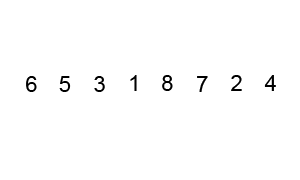Bubble sort#
You will implement the sorting algorithm bubble sort.
- bubble sort
a sorting algorithm that repeatedly steps through the input list element by element, comparing the current element with the one after it, swapping their values if needed until no swapping is needed.
The larger elements “bubble” up to the top of the list.

Fig. 20 Bubble sort step by step.
CC BY-SA 3.0. By Swfung8. Source: Wikimedia Commons#
Algorithm:
input: array
n = length(array)
repeat
swapping_occurred = false
for i = 1 to n - 1 do
if the pair array[i-1], array[i] is not in order
swap the pair
swapping_occurred = true
until not swapping_occurred
Requirements:
Implement the function
bubble_sort(char arr, bool (pair_is_in_order*)(char a, char b)).The function pointer
pair_is_in_orderdetermines whether the pair has to be swapped or not.Define two functions which can be used as
pair_is_in_order:letters_in_orderthat checks if the two givenchars are in order without case sensitivity. Assume that you will geta-zandA-Z. Examplesletters_in_order('a', 'b'); // true letters_in_order('a', 'B'), // true letters_in_order('b', 'a'); // false letters_in_order('a', 'A'), // true
numbers_ascendingnumbers_in_ascending_order(1, 2); // true numbers_in_ascending_order(1, 1); // true numbers_in_ascending_order(1, -1); // false
Define a function
swapthat can swap two elements of an array.swaphas two arguments. For example:char arr[] = {1, 2, 3}; swap(arr[0], arr[2]); // Now is arr = {3, 2, 1}
It is possible to implement
bubble_sortwithoutswap, but we need this function for modularity and to swap more complex objects in future.Your project should contain:
main.cwhich tests your function with at least the following arrays:char letter_arr1[] = {'z', 'S', 's', 'a'}` // aSsz char number_arr1[] = {4, -1, 2, 9} // -1, 2, 4, 9
sort.{c,h}which includes your implementationa flowchart of the algorithm. Use as much natural language as possible but visualize at least the two loops.
